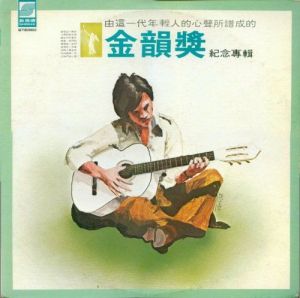
Golden Rhythm Awards album, Vol. 1
Various artists, Golden Rhythm Awards, Vol. 1 , 1977
ranking: #14 on 1975-1993 list
The jump from Yang Hsien’s 1975 Modern Chinese Folk Songs (中國現代民歌集) is so staggering I almost don’t want to talk about it. In short, Yang Hsien’s debut album and the “modern folk song” (現代民歌) concerts surrounding it brought to Taiwan new creative energy, combining elements of Western modernism, American folk, Chinese traditional music, and Taiwanese modern poetry to formulate something akin to a new musical movement. Elements of “modern folk” became popular among college students, and thus were appropriated by record labels, film producers, and television. Competing labels held their own singing contests, and Singer Music (新格) released Golden Rhythm Awards, Vol. 1 (金韻獎第一輯) in 1977 to commemorate its inaugural competition. The “campus folk song” (校園民歌) was born. The “modern folk song” as a popular movement was eclipsed by something a bit more youthful, a bit more innocent, and a bit softer along the edges.
The difference is immediate. Track number one, an undisputed classic in Taiwan’s popular music, is “Saying Good-bye to Cambridge Again” (再別康橋), with lyrics based on Xu Zhimo (徐志摩)’s famous poem of the same name. Like the appropriation of Yu Guang-zhong’s poetry in Modern Chinese Folk Songs, “Saying Good-bye to Cambridge Again” impressively reworks “high” literature into the cadences, stanzas, and verses of the pop song. But “Saying Good-bye,” sung by Fan Guanghui (范廣慧), seems less interested in capturing the meanings of the original work, than it is in using high culture as added value in a singing/composition competition presumably by and for educated people. The melancholy of the original is dissipated by the groovy bass fills and noirish piano tingles. Yet, for what it is, “Saying Good-bye to Cambridge Again” is deserving of its popularity, though Xu Zhimo’s original is undeserving of the association with Fan’s track amongst the generation of Taiwanese listeners who grew up with the song. The elements which seem to be totally incongruous with Xu Zhimo’s poetry are in fact what make it so effective as pop: nightclub atmospherics, upper-register theatricality.
Very little of it strikes one as “folk,” unless you count its kinship with pre-WWII Chinese culture to be a harkening back to roots. On the other hand, track two is “If” (如果), another bona-fide classic, perhaps the ultimate example of what late ’70s “campus folk” was all about. The acoustic guitar is so crisp and the vocals so cheery, you can almost hear the bluebirds chirping in the background. The high school poetry is adorably precocious (“If you are that sea, then I am that shore. / If you are that puff of smoke, then I am that light breeze.”), while the girl-on-girl harmonies would be every college boy’s fantasy if they didn’t sound so damn innocent. The basic campus folk instruments are also all present: a soft acoustic guitar, scattered xylophones to up the cute factor, escalating strings to up the emotion, and a wispy flute break to make it all sound so easy. But “If” remains a staple not because of the formula it helped inspire, but because of a memorable chorus you can rock your head to while you hum it.
Other recognizable songs include “Memories of Light Rain” (小雨中的回憶), which is basically “If” in a minor key, and “First Month’s Tune” (正月調), the sole Taiwanese-dialect song on the album. “Love, Deep and Borderless” (情深無邊), which won the competition for singer Chen Ming-shao (陳明韶), well represents how the campus folk wave had more in common with western melodramatic music like Nino Rota’s Romeo and Juliet theme than the modern folk movement from earlier in the decade.
The rest of the songs on the album are all fine compositions and competently performed, though few are memorable. Nevertheless, the output is of considerably high quality compared to, say, what you’d expect from an American Idol or One Million Star (超級星光大道) compilation disc. Few of the artists here would be remembered beyond the early years of college folk, though notables on Golden Rhythm Awards, Vol. 1 include budding star Pao Mei-sheng (包美聖), future bandleader Chiu Chen (邱晨), Taiwanese folk advocate Chien Shang-jen (簡上仁), and TV/radio host Liu Tsang-tai (劉蒼苔). I also can’t help but mention the inclusion of a track by Chu Tien-yi (朱天衣), sister of literary giants Chu Tien-wen (朱天文) and Chu Tien-hsin (朱天心).
In 1977, the major stars of the Golden Rhythm Awards had yet to emerge, such as Lee Chien-fu (李建復) in 1978, Jeng Yi (鄭怡) in 1979, and the most important of them all, Chyi Yu (齊豫), whose career would trace the rise and fall of campus folk, and continue to remain relevant as Taiwanese pop transformed again in the 1980s.
[The tracks of Golden Rhythm Awards, Vol. 1 can be individually streamed here.]
Leave a comment